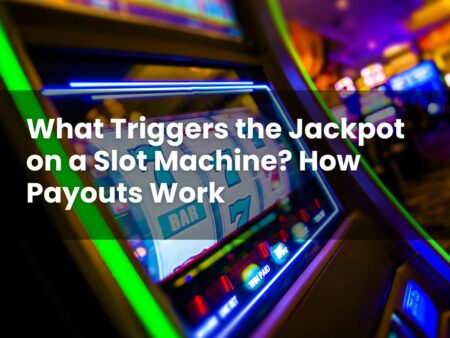Slot machines are designed to generate random outcomes, but some people wonder whether they follow a pattern when awarding payouts. This question often comes up in discussions about how these games work.
Some believe slot machines may determine when to release a win, while others see them purely as games of chance. Understanding how they function may help build a clearer picture of their mechanics.
In this blog post, we’ll explain how slot machines work & what determines when they pay out.
How Do Slots Work?
Slot machines operate using a technology called a Random Number Generator (RNG). This is a special computer program that generates thousands of numbers every second. Each number corresponds to a different outcome on the reels, ensuring every spin is completely random and independent of previous spins.
When a player presses the spin button, the RNG selects a number at that exact moment. This number determines the position of the symbols on the screen, deciding whether a win or loss will occur. Because of this randomness, there is no way to influence or predict the outcome of a spin.
Online slots work in much the same way as physical slot machines. Despite the differences in appearance, the underlying principle of randomness remains the same.
Every slot machine is also programmed with a specific theoretical Return to Player (RTP) percentage. This figure represents the percentage of all wagered money a slot is expected to pay back to players over time. However, this isn’t a guarantee for individual players in any single session. It is important for players to keep in mind that wins are not guaranteed.
How Do Slots Know When To Pay Out?
The short answer is: they don’t know in the way you might think. Slot machines don’t have memory and they don’t “decide” when to pay out. Each spin is entirely random, thanks to the Random Number Generator (RNG) mentioned earlier.
What this means is that slots don’t track how much you’ve played or how long you’ve gone without a win. They don’t “build up” to a payout or reward players for sticking with a game. Every spin is a separate event, with the outcome based purely on chance.
The idea that a machine is “due” to pay out is a common myth. In reality, even if a slot hasn’t paid anything for hours, it doesn’t mean a big win is coming. It’s just as likely to produce a win or a loss on the next spin as it was on the first.
Slot machines do, however, follow a set payout structure based on their design. This is where the Return to Player (RTP) and variance (or volatility) come into play. The RTP gives a long-term average of how much the game pays back to players. For example, a slot with a 96% RTP is expected to return £96 for every £100 wagered — but this is calculated over thousands, sometimes millions, of spins.
Variance describes how often and how big wins might be. Low-variance slots tend to pay smaller amounts more frequently, while high-variance slots may offer bigger wins, but less often. These are built into the maths of the game — not decided by when a player spins.
How Often Do Slot Machines Pay Out?
Slot machines are programmed to distribute payouts based on their designated RTP percentage. The RTP is a theoretical figure indicating the average amount of money that a slot will return to players over a long period. Note that this is an average for all players rather than individually, meaning wins are not guaranteed. This also does not dictate the frequency or timing of payouts in the short term.
Not all spins result in a win, and the randomness of each spin means payouts may occur at any time. Some players might experience consecutive wins, while others may not hit a payout for a number of spins or for the entire length of time they play.
It’s important to note that the frequency of payouts may vary between different slot machines. Some slots, known as “low volatility” slots, may offer smaller but more frequent potential wins, while “high volatility” slots may have the chance of larger payouts, but these potential wins might be less frequent.
While players might wonder how often they should expect a slot to pay out during a session, they should remember that randomness plays the leading role. The best approach is to play responsibly and not view any payout as a guaranteed outcome.
Can You Tell When a Slot Machine Will Pay Out?
It is impossible to predict when a slot machine will pay out. As mentioned previously, each spin of the reels is determined by a RNG, ensuring every outcome is completely random and unpredictable.
Players might see patterns or think they’ve found a technique to predict when a machine will pay, but these are purely coincidental. The design of the RNG means that there is no memory or pattern within the machine that may be deciphered.
Sometimes, players might hear stories or tips suggesting that specific actions or times may influence a machine’s payout. These are myths, as nothing players do may alter the random nature of a slot machine.
For a balanced experience, players may benefit from focusing on responsible play and viewing any win as an unexpected outcome rather than a guaranteed result. The key is understanding that every spin offers an equal chance, and chance is the sole factor in hitting a winning combination.
Play The Best Slots Online
Selecting a suitable online casino for playing slots may enhance a player’s gaming experience. With many options available, finding a site that aligns with a player’s preferences may be beneficial.
Players may want to look for casinos that offer a wide range of slot games, including both classic versions and the latest releases. To make the selection process easier, players can visit our site, which showcases a list of the best online casino sites. This list highlights options where players can explore popular slots and experience seamless gameplay.







